Rachel Held Evans's Blog, page 35
August 8, 2013
FREE discussion guide for “A Year of Biblical Womanhood” now available
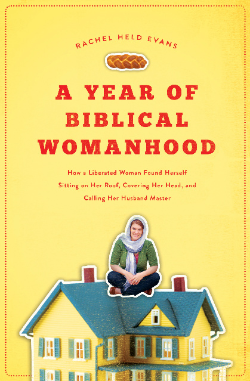
People often ask me what on earth was going through my mind when I decided to try a year of biblical womanhood. My answer is always the same: I wanted to start a conversation—about faith, about womanhood, about how those of us who love and esteem the Bible are to interpret and apply it to our lives.
Of course, this conversation is best had among friends, in living rooms and coffee shops, over homemade meals and shared bottles of wine, during the Sunday school hour or in those precious few moments of fellowship squeezed between meetings, play dates and appointments.
So it’s been such a joy to hear from readers who have used A Year of Biblical Womanhood for their book clubs or group studies. Many report that their discussions were filled with laughter, questions, honesty, encouragement, and a few friendly debates.
With these experiences in mind, Katie Strandlund and I put together a FREE, downloadable discussion guide intended to help nurture conversation. It includes questions for discussion and ideas for action corresponding with each chapter as well as a list resources for those wishing to learn more about the topics addressed in the book, (perhaps from people who don’t conduct their research from the rooftops of their homes).
You can download the discussion guide here. It will be available on the book page from now on.
It is a humbling honor to be invited into the lives of my readers by way of my books. I hope this strange story of mine gives you much to talk about!
Let me know if you have any questions or ideas.
[Oh, and by the way, there's a free discussion guide for Evolving in Monkey Town as well.]
***
Did your book club or discussion group work through A Year of Biblical Womanhood? If so, how did it go? What worked? What didn't work?



August 4, 2013
Sunday Superlatives 8/4/2013
 Around the Blogosphere…
Around the Blogosphere…
Best Interview:
Women in Leadership: An Interview with Nikki Toyama-Szeto
“There are also cycles of power we need to recognize. It’s very interesting to look through a Christian lens — there’s having power, there’s giving up power, and then there’s claiming power. Some of it depends on where you are in that circle, what the faithful response to power is. So in some cases, if you have power, the faithful response is actually to relinquish power or to use your power for somebody else. And then in other cases, when you’re disempowered, the faithful response is actually to step and to claim power. For example, trying to step into Shalom. Our world is broken and you might actually need to step in and say, this isn’t right. It is important for women in power to understand what of the power they have is theirs to give away, where do they need to take that power and step in and claim more-- possibly for their own self or for a greater thing such as the health of their organization — and where do they just need to steward the power that they have.”
Best Headline:
“Man Tries to Sneak Pet Turtle on Plane By Disguising It as a Hamburger”
Most Insightful:
Carolyn Custis James with “The Underlying Belief System of Spiritual Abuse”
“In Christian circles, the need to maintain male authority, the necessity for women to default to a submissive posture in relationship to men, and the subliminal conviction that women rank lower than men is the perfect recipe for spiritual abuse. It protects the abuser and puts the abused at risk. Worse still, it opens the door for other forms of abuse to take place within the church and at home behind closed doors.”
Most Challenging:
Zack Hunt with “Blogmatics: The Cost of Discipleship"
"Like Bonhoeffer, I am not interested in a Christian faith that makes no demands on my life, that leaves me the same way I was when I came to the foot of the cross, that does nothing more than put a stamp of approval on my imperfection and ordain my self-centered way of life."
Most Beautiful:
Antonia Terrazas with “I’m Leaving the Church”
"I’m leaving the church that passed me Christ’s peace in eyes and mouth and hands, not hurried, embarrassed, or even surprised to find me there, even happy to see me in a pew becoming regular, forgetting and learning my name a thousand times."
Most Heartbreaking:
Becca Rose with “What We Want When We Want Church”
“Take your hurt and leave. Come back when you're free and whole and not broken anymore. This isn't just this one church. This is church culture.”
Most Exciting (you’re going to love both of these books!):
‘Jesus Feminist’ Receives Advance Praise and
Tattooed Traditionalist: Nadia Bolz-Weber
For my favorite responses to the millennial conversation, see yesterday’s post.
On my nightstand…Life Together by Dietrich Bonhoeffer
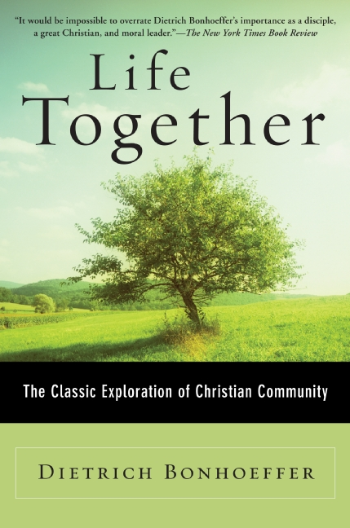
Jesus Freak by Sara Miles
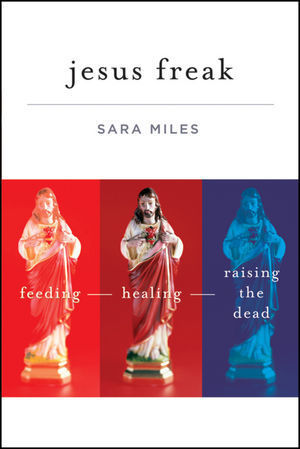
So, what caught your eye online this week? What’s happening on your blog?



August 3, 2013
New Post at CNN + Top ‘Millennial’ Responses + What the heck just happened?
So that was weird….
Last week I wrote a post for the CNN Belief Blog about millennials and the Church focusing on how church leaders hoping to win twenty-somethings over with coffee shops and concerts may want to go a little deeper and consider substance over style.
I’ve written another one today entitled “Why Millennials Need the Church”
The first post originally had a less ambitious title, something like, “For Millennials, Church Is More About Substance Than Style.” I wasn’t trying to write a manifesto or speak for a generation or exhaustively examine the causes of declining church attendance among twenty-something; just speak from experience with some surveys for support.
The post started quite the conversation online, generating hundreds of responses and a bunch of Facebook shares. Which is great. This is an important conversation to have. Many of these responses were insightful, honest, and wise, even when they were critical. I’ve shared some of my favorites below.
Of course, as more and more posts rolled in, the main point of the original post seemed to get a bit lost in the shuffle, and before long I hardly recognized the shallow, entitled church-hating know-it-all many assumed me to be.
Those who know me well know I’m only that way on Tuesdays.
But such is the case with “viral” posts. There’s no sense in trying to control the message once it’s out.
Anyway, those of you who have been reading me for many years know I don’t hate the Church and that my posts usually suffer from being too long rather than too short. Today’s article is much more reflective of that. It highlights seven reasons we need the Church, each corresponding loosely with a sacrament.
If you’re not sick of the topic already, you might want to check out these responses as well:
A Reluctant Millennial on the State of the Church by Meghan Florian
Millennial Canaries by John Hawthorne
Rachel and Brett, You’re Both Wrong by Jonathan Fitzgerald
Why We Left the Church (assembled by Micah Murray)
Trayvon Doesn’t Go to Your Church by Tyler Tully
Millennials and Leaving Church: Really? by Scot McKnight
Why are millennials leaving the church? Try Atheism by Hemant Mehta
So what the heck just happened? Why do you think the response to that post was so varied and intense? Feel free to share links to your own posts on the topic.



August 2, 2013
Christians and Education Inequity: An Interview with Nicole Baker Fulgham
When Nicole Baker Fulgham met one of her fellow faith-based public school advocates for coffee once, he recounted a conversation he had with a friend who is a long-time elementary school principal in the Bronx. Asked about his interaction with local churches, the principal said:
“In my twenty years of working in the Bronx, the neighborhood churches have only reached out to me two times. One time they came to lobby for prayer in public schools. The other time they protested new science curriculum that included evolution. Twice they contact me in twenty years---and they wanted to talk about school prayer and evolution. But you know what? For twenty years I’ve had kids who cannot read or do basic math. My students struggle to make it through school. We don’t have enough books, supplies, or resources for them. Our school building is literally crumbling around us. The kids have life-threatening, urgent needs. They’re hungry; they’re homeless. But in all these years, you’ve only criticized. You’ve never helped. Taking evolution out of my textbooks won’t change a thing for my kids. They’ll still be poor, uneducated, and stuck in the cycle of poverty. But not one church person has ever asked me about any of those things.”
Ouch.
The conversation made an impression on Nicole, who is the president and founder of The Expectations Project, a national organization that mobilizes people of faith to support public education reform and close the academic achievement gap. Spurred by this experience and many others from her career in education, Nicole recently released a book entitled Educating All God’s Children: What Christians Can—and Should—Do to Improve Public Education for Low-Income Kids .
I found Educating All God's Children both informative and challenging, and I wanted to introduce you to this true woman of valor. So today I’m thrilled to share a conversation with Nicole Baker Fulgham about Christians and the important issue of education inequity.

Rachel: In your book you describe how Christians have historically been very involved in improving education for disenfranchised children. Tell us a little more about that.
Nicole: I was so encouraged to learn about the long history of Christians working on educational equity issues. All the way back to William Wilberforce starting Sunday Schools for poor children in England, Christians have played a significant role in the fight for educational opportunity. Protestant groups founded some of our nation’s first public schools to ensure that every child (not just the children from elite families) had the opportunity to learn. And more recently, Catholic schools and Lutheran schools have demonstrated a staunch commitment to urban education—at a time when many wealthier families fled from our nation’s cities.
Rachel: You note that while Catholics, African Americans, Hispanics and many Mainline Protestants have continued to be involved in public education, White evangelical Christians are largely absent, until a “culture war” issue arises—(around school-led prayer, evolution, sex ed, etc.)— and the protests begin. What do you think happened? Why this disparity between an historical investment in public education by Christians and the current state of things?
Nicole: Yes, it’s heartbreaking to think that many people in the country haven’t perceived Christians as concerned with one of our nation’s biggest injustices. The good news is that I deeply believe this tide is starting to turn. At The Expectations Project, the non-profit organization I lead, we see so many Christians being drawn to this work. But on the whole, if we’re honest with ourselves, certain groups of Christians haven’t focused much effort on eliminating public educational inequity. Some of the disconnect is based on where some of us may live. If our own neighborhoods and schools are great, it’s easy to forget about those who aren’t as fortunate. And, historically, the evangelical community has taken several steps back from public schools over the last few decades—particularly since prayer was removed from schools. If we view schools as antithetical to our beliefs, it’s likely harder to get motivated to improve those same schools. Finally, I don’t think many Christians are aware of our historical connection to public education—and we need to reclaim that history and purpose.
Can you share some examples of churches that have partnered with schools to cast a better vision for public school achievement and equity?
One of my favorite stories is a church in Southern California whose pastor became burdened with educational inequity. He and his staff did a little internet research to identify the lowest-performing public school closest to their church. The pastor reached out to the principal and requested a meeting. In that initial meeting the church leadership simply said, “We are from a church about fifteen minutes from here, and we see that some of your students are struggling. How can we help?” The principal was taken aback, but mentioned that the school needed new computers so they could provide more robust instruction for students who were lagging behind. The pastor went back to his large congregation and raised an offering of about $50,000 for the school. Not surprisingly, the principal was blown away—and incredibly grateful. That, as they say, was the beginning of a beautiful friendship. The church held appreciation dinners for the teachers, and they began tutoring students and truly getting involved in the life of the school. Through their actions, this church demonstrated God’s love for the students, their families, and the teachers. And, in the midst of that, the students received additional support to improve their academic achievement.
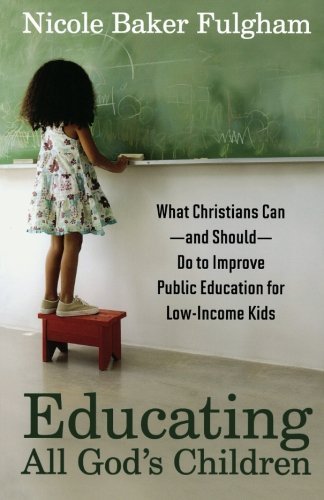
You suggest that some of the most effective models of closing the academic achievement gap are found at the school-based level. Can you share some examples?
Sure—I love talking about what’s working in public schools! More and more public schools are defying the low expectations of kids in low-income communities. These schools have a lot in common: They’re setting high expectations for all students, and they don’t waver on that. They are incredibly resourceful about how to help students meet those standards. They’re extending the school day to give kids more opportunities to catch up on what they missed. They are finding social support services to meet the needs of families who are struggling with poverty. These schools typically have a phenomenal principal who establishes a welcoming, community-based culture for kids and families. And, not surprisingly, these types of schools tend to attract and retain some of the very best teachers. And, quite honestly, none of these ideas are revolutionary—but they do require very hard work from multiple stakeholders.
What would you say is the #1 thing that Christians who aren’t directly involved in education as teachers or administrators can do to help change the disparity and achievement gap within America’s public schools?
This might surprise you, but I think Christians can have the biggest impact by becoming vocal champions of what’s possible in low-income public schools. Our society desperately needs more advocates for public schools who deeply believe in the God-given potential of every single student. If we don’t believe this type of success is possible, we will never garner the political will to enact the hard, but necessary, reforms. If we start proclaiming this belief over and over again in our communities—and then start putting our faith into action by becoming tutors, starting public school partnerships, and contacting our local, state, and national elected officials to demand change—then we’ll have a movement!
How do you respond to church leaders who are afraid of making education a priority within their congregations because they fear the public policy issues related to education are too political?
I totally understand this hesitation. The current climate on public education reform is often caustic and divisive. At times, neither “side” of the debate shows a lot of generosity towards each other. But I’d suggest that’s exactly why Christians should get involved in these issues! Where politics, special interests, and discord abound, it’s easy to lose sight of what’s in the best interest of the people who have the tiniest voice: the children. We have a unique opportunity to make educational equity a moral issue. We can bring courage to the debate, along with the commitment to find common ground. I deeply believe that we will not get to the best outcome for children in poor communities without faith communities taking a stand.
###
Be sure to check out Educating God’s Children. You can find The Expectations Project online or follow Nicole on Twitter.
If you're interested in becoming a better advocate for kids caught up in education inequity and are looking for some place to start, consider getting involved in Educational Equity Sunday.
So, how has your church been involved in public education? What obstacles keep you and your faith community from engaging more?



August 1, 2013
Be careful of dismissing another person’s painful (or joyful) Church experience
As responses to my CNN post about why millennials leave the
church have been pouring in, and as accusations of consumerism fly from one end
and of hypocrisy from the other, I was reminded of an older post from April
2012 that seems freshly relevant: “Better Conversations Between the Churched
and Un-Churched.”
An excerpt:
“When
someone opens up about the pain they’ve experienced in a church setting, only
to be met with eye rolls, sighs, and accusations of selfishness, why on earth
would they ever want to return?! And yet I see this scenario play out all
the time in Christian communities. A word to the wise:
When someone tells you they’ve been hurt by the Church, the proper response is
“I’m so sorry; tell me what happened,” not “suck it up, kid…" On the
other hand, I must admit that among young adults (myself included), there seems
to be an unhealthy appetite for stories about the church that are exclusively
negative. We get to talking about all the ways in which we’ve been
disappointed and ostracized, and the next thing you know, we’ve slipped right
into a contagiously cynical church-bashing session, the kind that can leave
those who have had beautiful, affirming, and life-giving experiences in church
feeling like the odd ones out. In that sense, the ‘un-churced’ are just
as guilty of invalidating the experiences of the ‘churched.’ We need
to be honest about the problems in the institutional Church, yes, but we also
need to read and share and celebrate positive stories about the institutional
Church.”
Read the rest.
I thought of this after reading this series of stories assembled
by Micah Murray entitled “Why We Left the Church,” which is also worth a read.



July 31, 2013
An animated conversation about the Bible.
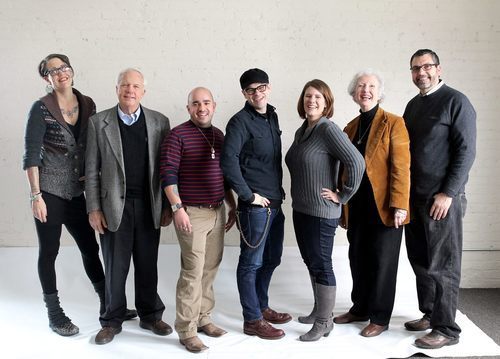
So last winter I had the awesome privilege of sitting down with a bunch of people WAY smarter than me to drink inordinate amounts of coffee and talk about the Bible. (You know you’re in over your head when Will Willimon cracks a joke about supersessionism that has Phyllis Tickle and Nadia Bolz-Weber giggling and you wondering what supersessionism is.)
The group also included Eric Elnes, Jose Morales, Jay Bakker, Tony Jones, and a team of talented illustrators and editors, all collaborating on the second installment of an adult education series called Animate.
While Animate.Faith covers what you might call the basics of the Christian faith, Animate.Bible focuses in on the Bible—its importance, its history, its interpretation, and its relevance. This is a topic close to my heart, so it was a joy listening and learning as Jose Morales (a bishop in the Disciples of Christ Church who also happens to be a DJ) explained how we can think about biblical genres much in the same way we think about musical genres, and as Jay Bakker shared why he hasn’t given up on the Bible, even when he’s seen it abused and misused. It was also fun to see each of our sessions turned into a video, complete with cool animations in the background.
Just as Aimate sparked some lively conversation among our group, so it is meant to spark conversation in small groups around the country. Each session encourages participants to discuss, sketch, doodle, create and share. It’s an open-ended approach that provides space for reflection and prayer in a beautifully illustrated journal.
The topic I tackled was the Testaments: How are we to approach the two testaments of Scripture in light of Jesus? What are we supposed to do with those strange stories from the Old Testament we struggle to understand? Is the Old Testament still relevant to Christians today?
Here's a clip:
Eric Elnes discusses the canon, Phyllis Tickle shares about the history of the Bible, Nadia Bolz-Weber illuminates the gospels, Jose Morales tackles genre, Will Willimon examines the interpretation process, and Jay Bakker talks about his favorite topic in the world - grace.
So if you’re looking for a great conversation-starter to use in your small group or church, you might want to check out Animate.Bible, which releases today.
I hope it generates as much laughter, discussion and debate as it did within our group.



An animated conversation about the Bible..

So last winter I had the awesome privilege of sitting down with a bunch of people WAY smarter than me to drink inordinate amounts of coffee and talk about the Bible. (You know you’re in over your head when Will Willimon cracks a joke about supersessionism that has Phyllis Tickle and Nadia Bolz-Weber giggling and you wondering what supersessionism is.)
The group also included Eric Elnes, Jose Morales, Jay Bakker, Tony Jones, and a team of talented illustrators and editors, all collaborating on the second installment of an adult education series called Animate.
While Animate.Faith covers what you might call the basics of the Christian faith, Animate.Bible focuses in on the Bible—its importance, its history, its interpretation, and its relevance. This is a topic close to my heart, so it was a joy listening and learning as Jose Morales (a bishop in the Disciples of Christ Church who also happens to be a DJ) explained how we can think about biblical genres much in the same way we think about musical genres, and as Jay Bakker shared why he hasn’t given up on the Bible, even when he’s seen it abused and misused. It was also fun to see each of our sessions turned into a video, complete with cool animations in the background.
Just as Aimate sparked some lively conversation among our group, so it is meant to spark conversation in small groups around the country. Each session encourages participants to discuss, sketch, doodle, create and share. It’s an open-ended approach that provides space for reflection and prayer in a beautifully illustrated journal.
The topic I tackled was the Testaments: How are we to approach the two testaments of Scripture in light of Jesus? What are we supposed to do with those strange stories from the Old Testament we struggle to understand? Is the Old Testament still relevant to Christians today?
Here's a clip:
Eric Elnes discusses the canon, Phyllis Tickle shares about the history of the Bible, Nadia Bolz-Weber illuminates the gospels, Jose Morales tackles genre, Will Willimon examines the interpretation process, and Jay Bakker talks about his favorite topic in the world - grace.
So if you’re looking for a great conversation-starter to use in your small group or church, you might want to check out Animate.Bible, which releases today.
I hope it generates as much laughter, discussion and debate as it did within our group.



July 30, 2013
Hell Series: Ask a traditionalist 1 (free will, postmortem repentance)….response
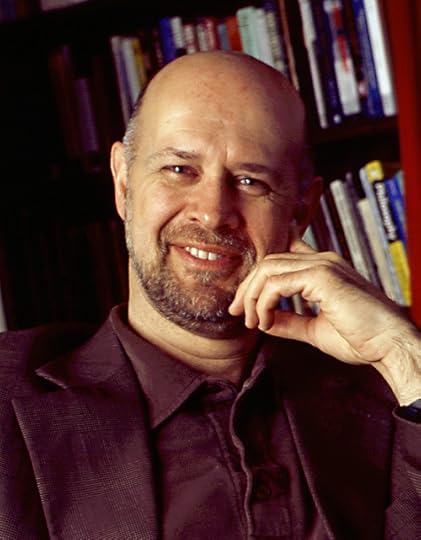
We’re taking advantage of our “Ask a…” series to talk with some of today’s leading theologians about the difficult topic of hell. Earlier this month, Edward Fudge responded to your questions about conditionalism (sometimes called annihilationism)—the view that immortality is conditional upon belief in Jesus Christ, so the unsaved will ultimately be destroyed and cease to exist rather than suffer eternally in hell. Later, Robin Parry responded via video to your questions about Christian universalism—the view that one day God will reconcile all people to himself through Jesus Christ.
As I began exploring options for the view typically referred to as “traditionalism”— that hell is a place of eternal torment—I realized there are a variety of perspectives to consider. For example, a Calvinist will likely view hell much differently than an Arminian….as would someone who identifies as an inclusivist as opposed to an exclusivist. Some, like today’s guest, believe in postmortem repentance, while others do not. So our interview today will not be the last entry in our hell-themed series! I’d like to also include a Calvinist, and perhaps a rabbi, as several of you suggested.
That said, today’s guest is a perfect fit for the series, and I think you will be delighted with how thoughtfully and thoroughly he responded to your questions. Jerry L. Walls was born and raised in Knockemstiff, Ohio. He has a PhD in philosophy from Notre Dame, and is the author of over eighty articles and reviews, and a dozen books, including Why I am not a Calvinst (with Joseph Dongell, IVP, 2004) and a trilogy on the afterlife: Hell: The Logic of Damnation (Notre Dame, 1992); Heaven: The Logic of Eternal Joy (Oxford, 2002); and Purgatory: The Logic of Total Transformation (Oxford, 2012). He is also the editor of The Oxford Handbook of Eschatology (Oxford, 2004). His co-authored book (with David Baggett) Good God: The Theistic Foundations of Morality (Oxford, 2011) was named the outstanding book in apologetics and evangelism by Christianity Today in their annual book awards. He has appeared on numerous radio shows including NPR’s “Talk of the Nation” and was interviewed for the documentary “Hellbound?” Before coming to Houston Baptist in 2011, where he is Scholar in Residence, he was a Research Fellow for two years in the Center for Philosophy of Religion at Notre Dame.
Jerry holds a traditional view of hell in the sense that he believes hell is a place of conscious, eternal misery. But he says he agrees with C.S. Lewis’ famous line that "the doors of hell are locked on the inside." His view is a modification of the traditional view in the sense that he believes God always welcomes sincere repentance, even after death. Unfortunately, he says, some will never exercise that option.
You asked. Jerry answered.
Enjoy!
###
From David: Given the possibility for postmortem salvation, your view, in principle at least, doesn't preclude universal reconciliation, does it? Would it be fair to call yourself a "hopeful universalist"? Or is the logic of your position at least compatible with (hopeful) universalism?
Indeed, in principle my view does not preclude universal salvation. In fact, that is exactly what I believe God desires (I Tim 2:4; 2 Peter 3:9). He is the God who does not rest content with having 99 sheep in the fold, but continues to seek the one who is lost, and rejoices when he is saved (Luke 15:3-7). So in view of this, eternal hell is an entirely contingent reality. There is nothing necessary about it. God does not need to damn some people forever in order fully to glorify himself, in order fully to be God, as some Calvinists would have it. To the contrary, God would prefer it if hell were empty.
Eternal hell only exists on the condition that some of God’s free creatures reject God’s love and grace and persist in doing so. So the reason I believe in eternal hell is because I believe some, unfortunately, will in fact persist in refusing grace, and be lost forever, and that this sad truth has been revealed to us.
I find myself in the ironic situation that I would be delighted if one of the things I have been defending throughout my career turns out to be wrong. It is at least conceivable, and perhaps possible as well, that the traditional interpretation of those texts that have been taken to teach that that some will in fact be lost is a mistaken interpretation. I hope it is, and that my universalist friends like Marilyn Adams, Robin Parry and Tom Talbott turn out to be right. I am not convinced by their interpretations although I do think they are at least plausible. But I want to be first in line to celebrate if I am wrong.
(For a defense of postmortem grace, see Purgatory: The Logic of Total Transformation, chapter 5; see also Kyle Blanchette and Jerry L. Walls, “God and Hell Reconciled,” in God and Evil, ed Paul Copan, et al.)
From Matt: Revelation 14:9-11 portrays the eternal torment of the condemned as taking place "in the presence of the holy angels and in the presence of the Lamb" (14:10). What does this mean? And how should we understand this portrayal in relation to other traditional images of hell as banishment from the presence of Christ?
Well, I’d start here with Paul’s sermon at Mars Hill, where he observes that God is “not far from each one of us. For in him we live, and move and have our being” (Acts 17:27-28). In this passage, Paul is applying this point to people who may be seeking God, but have not yet found him. So the point here is that even people who may be “far” from God in terms of meaningful, loving relationship are still “close” to him in the sense that he continually sustains them in existence.
So the unhappy creatures in this text in Revelation are in the presence of the Lamb by virtue of the fact that he sustains them in existence, and they may even be aware of this fact. However, they are utterly separated from him by their sinful rebellion.

Indeed, the paradoxical nature of this observation may illumine why fire is used as an image of the torments of hell. Fire in the Bible is a common image for the presence of God, not his absence (cf Deut. 4:24; 5:24-5; Psalm 50:3; Hebrews 12:29). But his presence is experienced very differently by those who are rightly related to him, as opposed to those who are not.
David Hart has noted that there is a long theological tradition, particularly in Eastern Orthodoxy, that “makes no distinction, essentially, between the fire of hell and the light of God’s glory, and that interprets damnation as the soul’s resistance to the beauty of God’s glory, its refusal to open itself before the divine love, which causes divine love to seem an exterior chastisement” (The Beauty of the Infinite, 399).
As the Psalmist noted, there is no place where we can successfully flee from God’s presence (Psalm 139:7ff). The God of love is everywhere, and we cannot exist a millisecond without his sustaining grace and power. But our freedom does allow us to refuse his love and go our own way, even as it remains true that “in him we live and move and have our being.” If that is our choice, his glorious love will be experienced like a burning fire rather than “the spring of the water of life” that will deeply quench our thirst (Revelation 21:6).
Can you explain what you mean when you talk about "optimal grace"? And how does the doctrine of election, as understood by some Calvinists, provide an unsatisfactory or incomplete view of God’s grace as it relates to hell?
This idea is central to my view of hell, and also to purgatory, so I will try to make this clear in a reasonably concise way.
Let me begin my explanation by saying what is involved in choosing hell. People do not choose to go to hell as a direct choice. It’s not like anyone says, “hey, I really want to go to hell”! Rather, they choose to go to hell by resisting grace and choosing evil. And not just choosing evil initially or partially. After all, we all choose evil initially by virtue of being fallen. What defines the choice of hell is that God and his love are decisively rejected and evil is decisively chosen instead.
Here is where optimal grace comes in. In short, optimal grace is whatever form and measure of grace is best suited to elicit a positive response from us, without overriding our freedom. Because we are all different, the exact nature of this will vary from person to person. But the important idea is that if God truly loves each one of us, and truly desires our salvation, he will offer his love and grace to each of us in the way that is optimal to elicit a positive response.
Pretty clearly, not everyone has such grace in this life, and that is one of the reasons I believe in postmortem grace and repentance. What this means is that in the long run, everyone has an equal opportunity to be saved. In the afterlife, God can find ways in his infinitely creative wisdom to give everyone the best opportunity to respond to the gospel.
What this underscores is that no one goes to hell because of ignorance or lack of opportunity to be saved. Nor does anyone go to hell for rejecting a distorted or garbled view of Jesus and his amazing love. No, emphatically not! You go to hell for rejecting Jesus, not a caricature of Jesus. You go to hell for spurning the amazing grace he showed us in the cross and resurrection, not for being ignorant of it.
But in order for that to happen, you have to be properly and truly aware of who he is and the truth and beauty of his love. Only when you are properly informed of the truth can you freely, deliberately and decisively reject it. In other words: a decisive choice of evil is only possible given optimal grace.
So that is what is amazing and even perplexing about the idea of hell. A lot of people assume that if optimal grace were true, universal salvation would automatically follow. But again, I would insist that eternal hell is not in any way due to some having less opportunity to be saved than others. I believe some people will decisively reject God’s love and be lost, even though he gave them every opportunity to repent and be saved.
And thanks for raising the Calvinist connection because this is something I am always happy to talk about. Actually, however, the problem with the Calvinist view of election is much worse than being merely unsatisfactory or incomplete. As Calvinists see it, some people get irresistible grace by which they will inevitably be saved, and others are completely passed over with respect to saving grace, and are inevitably damned. The unequal distribution of grace here is poses insurmountable problems for God’s goodness.
Indeed, Calvinism and eternal hell are a lethal combination that is biblically, logically and morally indefensible. It can only be defended by forthrightly admitting that God does not love everyone (which Calvinists are often loath to do, for good reason), or by engaging in misleading rhetoric, which is the far more common strategy. If you want to be a Calvinist, you should be a universalist. I do not have the space to defend those claims here, but I have done so elsewhere. See my You Tube videos entitled “What’s Wrong with Calvinism” as well as my co-authored book, Why I am not a Calvinist.
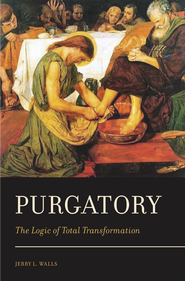
Now what I find interesting, however, is that many people who are not Calvinists believe that God gives everybody at least some chance to be saved, but not optimal grace. They hold that at least some ray of light has come into every life, or that everyone has heard the gospel at least one time. They affirm that everyone is given at least what we might call “minimal grace.”
And why do they insist on this? Because they want to be able to say that God is fully just in damning such people. In other words, it is important that everyone have enough grace or opportunity for salvation that God can be just in sending to hell those who die without faith. But optimal grace is not required for this.
Now here is the question: If God can make sure everybody has at least some real opportunity to be saved, why could he not make sure that everyone has optimal grace? Does he lack the creativity, the wisdom, or the means to do this? And more importantly, if he could do this, is it not the case that he would do so? Why would he not?
So here is one of the most fundamental issues in how we conceive of God, one that will profoundly shape not only our view of hell, but our entire theology. Does God genuinely, deeply, love all persons and desire to save them? Or is his only concern to give them enough revelation and grace that he can justly damn them if they die without faith?
There is far more to say, of course, but this answer is already rather long. If you want to explore this further see Hell: The Logic of Damnation, chapter 4; Purgatory: The Logic of Total Transformation, chapter 5, and the essay “God and Hell Reconciled, cited above. If you want just a bit more on the last point, see this video.
From Tanya: I'm having a hard time wrapping my head around this position. While it makes beautiful, logical sense --(you get to keep Hell, and a merciful picture of God to boot) what would this look like? Who in their right mind would sit in hell, "in conscious, eternal misery" and simply refuse to repent? At that point, believing in the existence of God doesn't seem tough, I mean, somebody is responsible for the hell you are in -- so who would sit and stew for eternity "on principle?" Can you paint me a believable picture of a specimen of humanity who might do this?
Let me begin here by saying I am with you in thinking there is something absurd in the idea of someone freely choosing eternal hell. I wrote a defense of eternal damnation for my PhD dissertation at Notre Dame several years ago, and my biggest challenge was trying to make sense of how anyone could freely choose the misery of hell. I am currently writing a popular level book tentatively entitled Heaven, Hell and Purgatory: Life as Comedy, Life as Tragedy, Life as Story. I just finished the chapter on hell, and I am still struck by how crazy this can seem. And yet, the decisive choice of evil does have a certain logic and we can make at least some sense of it.
What is clear is that people who do this are not altogether “in their right minds.” That is, they are not thinking clearly, they are not embracing the truth about themselves and about God. They are deceived at a deep level. And yet, they are not deceived in the sense that they are innocent victims. Rather, they are self-deceived.
If you want a believable picture of this, read CS Lewis’s book, The Great Divorce. In case you have never read it, the premise of the book is that a group of people (“ghosts”) from hell take a bus ride to heaven and are invited, indeed, implored to stay. Common sense, of course, assumes that they would jump at the chance. But what Lewis depicts, with remarkable psychological and emotional plausibility, is how almost all of them spurn the offer and return to hell.
As Lewis famously remarked in another book, “the doors of hell are locked on the inside.” It is not that God locks them in against their will, but they are not willing to come out. Lewis went on to comment: “I do not mean that the ghosts may not wish to come out of hell, in the vague fashion wherein an envious man ‘wishes’ to be happy: but they certainly do not will even the first preliminary stages of that self-abandonment through which alone the soul can reach any good.”
One of the more memorable of the characters that illustrate this truth is a “Big Ghost” who takes the trip to heaven bent on getting his “rights.” When he gets there, he is greeted by a man who was one of his employees in this life. He is outraged at this because the employee had murdered someone, and he cannot fathom how the employee can be in heaven, while he has been in hell. What he simply cannot (will not) understand is that he too, needs grace, that he too needs to be forgiven for his own sins and transformed before he is fit for heaven. When he realizes this, and that his former employee is the very person sent to instruct him, he decides to return to hell.
“So that’s the trick, is it?” shouted the Ghost, outwardly bitter, and yet I thought there was a kind of triumph in its voice. It had been entreated: it could make a refusal: and this seemed to it a kind of advantage. “I thought there’d be some damned nonsense. It’s all a clique, all a bloody clique. Tell them I’m not coming, see? I’d rather be damned than go along with you….” It was almost happy now that it could, in a sense, threaten.
Notice particularly that the Ghost is “almost happy.” What this points out is that hell has its pleasures, and its own version of “happiness.”
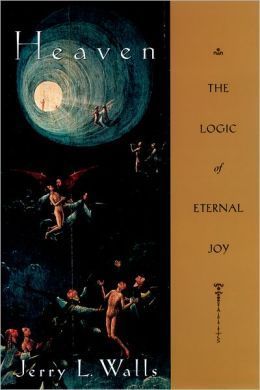
I’m sure all of us can relate to the pleasures of resentment, bitterness, self-righteousness and so on. It is not hard to see that anyone who is resentful is not truly happy, indeed, they are miserable. But those who choose to hold on to their resentment do enjoy a perverse sort of pleasure and a distorted sense of satisfaction. To anyone who urges them to repent and give it up, they may well give the bird and insist they are doing just fine, thank you.
I have tried to make philosophical sense out of this in chapter 5 of Hell: The Logic of Damnation, as well as in the popular book I am currently writing. Also, keep your eyes open for Kevin Timpe’s forthcoming book Free Will in Philosophical Theology, which has a very insightful discussion of the logic of choosing evil, including damnation. But again, I’d start with Lewis.
Similarly, Nate asked: First, what is the nature of the "conscious, eternal misery?" Is it physical (fire, pain, etc.), is it emotional/spiritual (loss, separation, despair, etc.), or is it both? Second, if there is opportunity for repentance upon experiencing conscious misery, why would some not choose it? This seems to go against the human instinct for survival and comfort.
I think the essence of the misery of hell is the natural unhappiness that results from resisting the love of God and having a character decisively formed by evil, with all that that entails. For instance, such a character cannot enjoy meaningful relationships, which are essential to human happiness. The nature of such misery is not hard to understand, indeed, there is a profound continuity between such misery and the misery evil naturally produces in this life. John Wesley put it like this:
For it is not possible in the nature of things that a man should be happy who is not holy….The reason is plain: all unholy tempers are uneasy tempers. Not only malice, hatred, envy, jealousy, revenge, create a present hell in the breast; but even the softer passions, if not kept within due bounds, give a thousand times more pain than pleasure.
However, I also believe that the misery of hell includes a physical dimension for the simple reason that human beings are embodied beings by nature, and the damned will be resurrected in their bodies. I do not believe the fire is literal but rather an image, just as I think “the worm that does not die” is an image or a metaphor (Mark 9:48). As has often been pointed out, hell is also pictured as darkness (eg Matthew 22:13), and literal fire and darkness are incompatible. This does not mean that the realities imaged by fire, undying worms and darkness are not terrible because that language is metaphorical rather than literal. After all, a metaphor communicates because it the reality it depicts is similar to the image that is used.
I discuss my view of the misery of hell in detail in chapter 6 of Hell: The Logic of Damnation.
From Rachel: So the most common Bible passage cited by those who oppose the possibility of postmortem salvation is probably Hebrews 9:27-28: "And inasmuch as it is appointed for men to die once and after this comes judgment, so Christ also, having been offered once to bear the sins of many, will appear a second time for salvation without reference to sin, to those who eagerly await Him." How do you interpret these words from Priscilla and Aquilla? (Okay, so that last bit is a personal theory about the authorship of Hebrews, but the question still stands!)
Well, I think this text is way overrated by those who cite it against the possibility of postmortem conversion. Not the text itself, because it’s pretty hard to overrate Biblical texts, but rather the way the text is interpreted. In short, those who cite this text for that reason are trying to squeeze more out of it than it actually says. So what does it say? We die once. Well, I certainly agree with that, and I would guess most proponents of postmortem salvation do not posit that we die multiple deaths.
Next, it says that after we die, there is judgment. And of course I agree with this. But notice: it does not say judgment is immediately after death, nor does it say, (if there is an immediate judgment) that it is final. Indeed, most traditional theology holds that the final judgment is yet to come. So there could well be a preliminary judgment immediately after death that would judge one’s life to that point, but that judgment could still allow for repentance.
The text goes on to compare and contrast the first and second comings of Christ, but again, I see nothing there that rules out postmortem repentance.
It is also worth emphasizing that God’s word of judgment often leads to repentance and ends in mercy and redemption. For just one example, consider Jonah’s word of judgment to Nineveh: in forty days, Ninevah will be overthrown (Jonah 3:4). Of course, as the story turns out the Ninevites repented and their city was not overthrown. Did God change his mind? No, he did not. Implicit in the word of judgment was an invitation to repent. The Ninevites, however, did change their minds, which is what repentance literally means, a change of mind. Had they remained impenitent, the judgment would surely have fallen.
From Chris, and the community at rethinkinghell.com: Proponents of the eternal conscious torment view typically hold to the biblical teaching that the unsaved are likewise resurrected and that both body and soul are subject to hell. However, they believe that these resurrected bodies of the lost will live forever, albeit separated and isolated from God. Yet the Bible explicitly says that only God has immortality inherently and that immortality is brought to light through the gospel and granted to the glorified saints who persevered in the faith to the end, whereas it does not appear to say anywhere that immortality is granted to the unsaved. So when eternal conscious torment is the very question at hand, what biblical evidence would you point to as teaching that the resurrected bodies of the lost will likewise be made immortal?
Immortality, like eternal life, is far more than ongoing conscious survival, or even the resurrection of our bodies. Or to use a distinction philosophers often employ, continued survival is necessary but not sufficient for immortality. Scripture of course speaks of a resurrection of both the just and the unjust (John 5:28-9; Acts 24:15). Immortality properly speaking is the resurrection to the fullness of life in relation to God and others for which we were created. It is the glory that comes from having the character and likeness of Christ (2 Cor 3:18; 4:4-7).
It does not follow, however, that to fall short of glory, as sin inevitably causes us to do (Romans 3:23), is to lose existence altogether. The resurrection of the unjust can be a resurrection to ongoing existence even though it is not resurrection to the immortality of life with God. I believe that texts like the one from Revelation 14 cited above give us reason to believe that even those who reject God’s gift of salvation and the glorification that entails still remain in conscious, embodied existence. Indeed, they remain in relationship to God even though it is a relationship of sin and rebellion.
I will grant you the biblical data on this matter is debatable. But if hell is freely chosen, as I have argued, and is not the torture chamber sometimes depicted, the conditionalist view loses a lot of its motivation. God’s perfect love and goodness is perfectly compatible with those persons who refuse the gift of salvation and immortality, but whose ongoing existence is defined by an ongoing rejection of the very God of love in whom they continue to “live and move and have their being.”
From Preston Sprinkle: Are there degrees of punishment in Hell? And if so, could those who receive a "lesser" sentence ultimately be annihilated? For instance, a 15 year old Saudi girl has been raped her whole life, and has just met a Christian on the streets who gave her a 5 min gospel presentation (in Arabic), making her now accountable, but seconds later she gets hit by a bus: will she be kept alive by Jesus so that she will consciously feel the most tormenting pain for ten trillion years. And more? And will she sit alongside Hitler in his misery? I ask not facetiously or rhetorically (assuming a right answer), but because I've been faced with the same question ad nauseum.
Yes, I do think scripture gives us reason to think the misery of hell varies in quality as well as intensity, depending on the patterns and kinds of sin committed. A person consumed with hatred, for instance, likely experiences a different sort of misery than one who simply let his life and character be formed by following his lusts and desires. The different forms of suffering Dante depicts, as well as Lewis in The Great Divorce, is very suggestive in that regard.
As for the scenario with the 15 year old girl, well, that is the very picture of “minimal grace” and the very sort of thing that would be ruled out by my view of optimal grace. Given this story, we have no reason to think this girl has really understood the gospel, let alone well enough to reject it decisively. The assumption that she would be lost forever simply because she heard one garbled sermon makes the doctrine of hell as often defended a moral and theological absurdity.
From Eric: Whoa, whoa, whoa. This is not directly related to the post, but there's seriously a place called Knock 'em stiff, Ohio?
Not only is there really a place named Knockemstiff, Ohio, but it has also achieved notoriety fairly recently in literary circles. This is due to my friend and high school classmate (though he dropped out his Jr. year and did not graduate with our class) Donald Ray Pollock, who lived up the road from me in Knockemstiff, and has used it for the setting in his critically acclaimed fiction. Don burst on the literary scene in 2008 after working 32 years as a truck driver in a paper mill when he published an extraordinary short story collection entitled Knockemstiff. He followed that up a couple years later with a novel, The Devil all the Time, which won several awards including “Badass Book of the Month” from GQ. He is currently finishing his third book, another novel, on a Guggenheim fellowship.

Before he published his collection of short stories, I arguably had the title of “Greatest Writer from Knockemstiff.” Now I have to content myself with the thought that I am likely the most accomplished writer in my high school graduating class.
Don’s books are a bracing read, but be forewarned that they are on the far end of “raw and gritty.” In fact, it is not too much of a stretch, given our current discussion, to suggest that his books provide some vivid glimpses of hell. Here, by the way, is my review of The Devil all the Time.
###
Thanks again for your questions! You can check out every installment of our interview series—which includes “Ask an atheist,” “Ask a nun,” “Ask a pacifist,” “Ask a Calvinist,” “Ask a Muslim,” “Ask a gay Christian,” “Ask a Pentecostal” “Ask an environmentalist,” “Ask a funeral director,” "Ask a Liberation Theologian," "Ask Shane Claiborne," "Ask Jennifer Knapp," "Ask N.T. Wright and many more— here
.



July 29, 2013
More on millennials and the future of Christianity...(a list of resources & conversations)
Well, my CNN post on millennials and the Church got shared like crazy this weekend, (with over 165,000 Facebook shares so far), so I guess it struck a nerve! I hadn’t intended it to be a comprehensive piece on the faith of millennials, just a commentary on how—generally, based on multiple surveys and my own experience—millennials in the U.S. long for change in the Church that goes beyond worship style and marketing. So it’s been nice to see the conversation continue as church leaders, researches, and my fellow millennials weigh in. I’ll try to share the most thoughtful pieces here and on Twitter/Tumblr as the week goes on.
In the meantime, I’ll just address a few common questions in relation to the piece and suggest some resources for learning more from the real experts on this topic:
1. Where do you get your research?Barna
It’s pretty much impossible to find a survey that doesn’t report a dramatic decline in church attendance among young adults, but the ones that interest me the most are the ones that ask young adults why they have left the church.
One of the most helpful examinations of such research is David Kinnaman’s book, You Lost Me, which is based on data from The Barna Group gathered from 2007 and 2011. Kinnaman found that 59% of 18-29-year-olds in the U.S. with a Christian background report they have “dropped out of attending church regularly.” That translates into about 8 million young adults who have left, or are leaving the church. In sifting through Barna’s research findings, Kinnaman identified six themes that he says “captures the overall phenomenon of disconnection between the next generation and the church.” Young adults in the U.S. consistently reported that they left the church because they found it 1) overprotective, 2) shallow, 3) anti-science, 4) repressive (especially regarding sexuality), 5) exclusive, 6) hostile to those with doubts and questions about their faith.
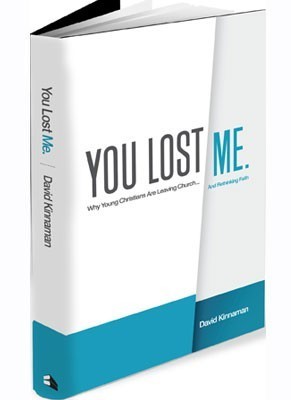
You can read more about these trends in the book, You Lost Me, which I highly recommend. Also check out this video, this video, and the "You Lost Me" Web site.
Pew Forum
Data from The Pew Forum on Religion & Public Life shows similar trends. Its most recent surveys on this age demographic show that “fully one-in-four members of the Millennial generation - so called because they were born after 1980 and began to come of age around the year 2000 - are unaffiliated with any particular faith. Indeed, Millennials are significantly more unaffiliated than members of Generation X were at a comparable point in their life cycle (20% in the late 1990s) and twice as unaffiliated as Baby Boomers were as young adults (13% in the late 1970s). “
Pew reports that “in their social and political views, young adults are clearly more accepting than older Americans of homosexuality, more inclined to see evolution as the best explanation of human life and less prone to see Hollywood as threatening their moral values. At the same time, Millennials are no less convinced than their elders that there are absolute standards of right and wrong. And they are slightly more supportive than their elders of government efforts to protect morality…” Back in March of this year, The Pew Forum made news when it reported that 70% of millennials are in favor of same-sex marriage.
Pew has several interactive and informative pages devoted to millennials that I recommend checking out if you’re interested in learning more. They also include more information about Latino millennials and African American millennials.
Public Religion Research Institute
The most recent survey to make headlines comes from the Public Religion Research Institute, which found that for people ages 18-33, religious progressives outnumber religious conservatives. The survey “shows that religious progressives are a more significant group than is usually assumed, and there is a strong social justice constituency among religious Americans that cuts across labels,” according to E.J. Dionne, a Brookings Senior Fellow. Like the others, this survey reveals increasing numbers of millennials unaffiliated with church.
(Some have noted that a weakness in this survey is that it did not examine the influence of the growing numbers of Asian American Christians in the U.S.)
So while some pastors may be seeing healthy numbers of millennials in their churches, statistically, this is not the norm in the U.S. And it’s worth addressing why.
Obviously there are additional factors to consider, including changes in average marrying age and increased education that contribute to these trends. But we can’t discount the fact that millennials are leaving the church at a higher rate than previous generations, nor should we ignore their responses when asked why they don’t want to go to church.
2. What about Mainline Protestantism?As an evangelical (or at least a post-evangelical!) I generally write with an evangelical audience in mind, but as others have rightly noted, it’s not just evangelical churches losing young adults, but also Catholic churches, Orthodox churches, and Mainline Protestant churches…sometimes at even higher rates. I often hear from “Mainliners” who essentially say, “Hey, we’re much more open to science, social justice, political diversity, and LGBT people. Why aren’t these disaffected millennials flocking to us?” I’m not qualified to answer that question comprehensively. I can only share my own experience, which I did with a post entitled “The Mainline and Me.” (My friend Aric Clark, a PCUSA pastor, wrote a fantastic guest post in response, entitled “The Passionate Mainline.”)
Probably the best person to consult on this topic is Diana Bulter Bass, author of Christianity After Religion, Christianity for the Rest of Us, and a host of other books. Diana has covered renewal in Mainline churches as both a religious historian and journalist for more than a decade and is optimistic about the future of Mainline Protestantism.
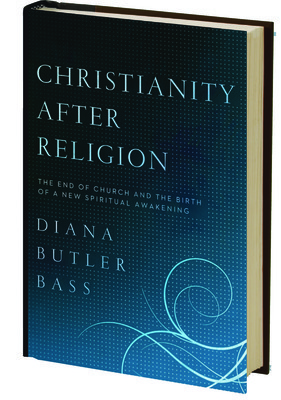
For more on Diana’s perspective, check out this recent interview from Jonathan Wilson-Hatrgrove, or this article on the Huffington Post about the future of faith, or one of her excellent, informative books, particularly Christianity After Religion or The Practicing Congregation. I'm also wondering if "Ask Diana Butler Bass..." may be in order!
3. What about global Christianity and immigrant and ethnic minority communities in the U.S?This is probably the most under-reported angle to stories about the future of Christianity, but perhaps the most important. The reality is, Christianity’s center of gravity has shifted away from Western Christianity to Africa, Asia, and Latin America. In fact, it has been suggested that by 2050, African, Asian, and Latin American Christians will constitute 71 percent of the world’s Christian population. So when we talk about the future of Christianity, we can’t do it well without looking beyond its white, American expressions.
My favorite book on the topic is The Next Evangelicalism by Soong-Chan Rah.
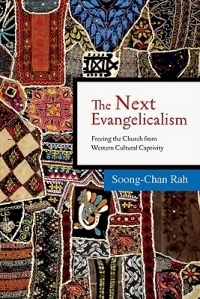
According to Rah, “fifty years ago, if you were asked to describe a typical Christian in the world, you could confidently assert that person to be an upper middle-class, white male, living in an affluent and comfortable Midwest suburb. If you were to ask the same question today, that answer would more likely be a young Nigerian mother on the outskirts of Lagos, a university student in Seoul, South Korea, or a teenage boy in Mexico City. European and North American Christianity continue to decline, while African, Asian, and Latin American Christianity continue to increase. “
Rah adds: “Contrary to popular opinion, the church is not dying in America; its is alive and well, but it is alive and well among the immigrant and ethnic minority communities and not among the majority white churches in the United States.”
We will be discussing The Next Evangelicalism in the next few weeks—hopefully with an interview with Professor Rah— so I recommend picking up this challenging and insightful book.
4. Should the Church change for millennials? Aren’t you being a bit demanding?No, the Church shouldn’t change for millennials…but I think the Church must (and will) change along with millennials. In other words, we need not compromise the historical tenets of the Christian faith to recognize that this generation has something valuable to contribute to the future of Christianity, as does Generation X, the Boomers, and the generations before them. The article wasn’t intended to be a list of demands, but rather an expression of desires, a casting of vision and an articulation of my hope for the Church. Obviously, the real work begins when we come together in community to do the hard, daily work of reconciliation, listening, serving, and worshipping in spirit and truth.
To get a better understanding of my own journey within evangelical Christianity, check out my first book, Evolving in Monkey Town. (My second book, A Year of Biblical Womanhood, deals with biblical literalism, gender issues, and me being a crazy person for year.)

And—I guess this is sort of an announcement!— my third book, to be published by Thomas Nelson in 2014, is about this very topic: Church. I’ll share more about that in the months to come.
5. How can I keep track of how this conversation develops?I’ll share my favorite responses to the discussion here, and on Twitter, Tumblr, and Facebook. If you’ve written on the topic, or if you write about it this week, feel free to leave a comment with a link in the comment section; I'd love to hear your thoughts.
###
Here are some interesting responses (both positive and negative!):
A Conversational Way Forward: Responding to the Exodus of Millennials from our Churches by Christopher Smith
Is Rachel Held Evans right? by Bishop On a Bike (James Hazelwood)
United Methodists Wearing A Millennial Evangelical Face by Anthony Bradley
As always, thanks for the dialog! I’ve already learned a lot from your responses.



July 28, 2013
Sunday Superlatives 7/28/13
Best Video:
N.T. Wright at The Work of the People with “Look At Jesus”
“We’ve never had Jesus in our pockets.”
Best Photo:
NPR with “The 40 year Old Photo That Gives Us Reason To Smile”
Best Perspective:
Gina Dalfonzo at Her.Meneutics with “I’m Childless, Not Child-Incompetent”
“It's been one of my greatest joys to learn that the childless life doesn't have to be a child-free one. Though I'm not and never will be as significant a figure in their lives as their parents, my three godchildren and I have something special that's all our own. Like the Kenny Chesney song I used to sing to my younger goddaughter when she was a baby, until her country-music-hating mother threatened to fumigate the house. Or the fact that her big sister believes I'm the only person on the planet who knows how to extricate a tooth properly.”
Best Writing:
Sarah Bessey with “In Which I Climb a Metaphor”
“Starting something hard is way more fun than finishing it well. Only the pines witness the resolute courage to keep moving.”
Best List:
"The Seven Wikipedia Topics More Controversial Than Jesus”
“While Jesus and Christianity both make appearances, they're apparently less controversial than anarchism, the prophet Muhammad, and professional wrestlers.”
Wisest:
Peter Chin at Christianity Today with “Will we ever get beyond race?”
“Fear had taught me to view with suspicion anyone not like me, but in the church I found brothers and sisters who could not have been any more dissimilar except for the fact that Jesus had given us all new life.”
Bravest:
Bronwyn’s Corner with “I am the immigrant”
“I felt so hurt. So unwanted. I stood with a leaden-heart behind him during a worship service and silently pleaded at his back: “My brother in Christ, with whom I share citizenship in the Kingdom of Heaven: do you know that I am one of ‘them’? Do you know that I am the immigrant in the immigration reform you’re talking about? Do you know that without some reprieve in the current legislation, we may have to go? Your wife would have one less bible study leader, your kid would have one less parent volunteer in the classroom, your business would have one less paying customer. Did you know it was ME you are closing the door on?”
Most Thoughtful:
Open Parachute with “The Galileo fallacy and denigration of scientific consensus”
“The real lesson from Galileo is not to oppose the “establishment” or current scientific consensus – but to rely on evidence. It was this argument of his, which today most of us accept and see as almost self-evident, that describes Galileo’s real contribution to the progress of science.His argument for the heliocentric solar system, and against a geocentric solar system, was really an argument of evidence against dogma, prevailing philosophy and the Church’s use of scripture.”
Most Relatable:
Micha Boyett at Deeper Story with “Simplicity, Complexity, Faith”
“The truth? My faith is braided right alongside uncertainty and guilt, emotion and memory. I doubt. I ask every question, second-guess every motive of the souls around me. I challenge the intentions of denominations and the small-thinking of theological stances. I scoff. I forget that God chases, that God is a clanging Love, begging us to stop our words, stop our minds, and notice. When we notice, we see simplicity. Death and life. Love beyond height or depth and breadth. Love expanded into the universe, covering every part of us. Not words. Not words. Not words. Presence.”
Most Personal:
Austin Brown at Christena Cleveland’s blog with “On Being Black and Female in White Evangelical America”
“After ten years of being committed to reconciliation work, I have found that occasionally it is necessary for others to point out the fact that I am young, black and a woman….Sometimes the words are said with disdain, dripping from the mouths of men who cannot fathom that such a being could possess something so precious, so risky as authority. But usually it is spoken quietly, in hushed tones, as if my brownness might flee in fright if spoken too loudly.”
Most Encouraging:
Jeff Leach at the Jesus Creed blog with “A Pastor’s Husband Regarding His Pastor”
“I really do believe it is our calling. After all, the two shall become one, so how can we have different callings? Sure we have different gifts and edify the body in different ways, but my actions and how I live out my relationship with Tara Beth can greatly impact her ability to live out her calling to her fullest. For us, this can manifest in activities like talking through her sermon on a Saturday night, taking the boys out of the house for an entire day so she can meditate and write a sermon, whispering a prayer for her as she gets up to preach, reading the same theology book with her so we can discuss it, or caring for the boys and just letting her sleep in on a Saturday after a rough week of ministry. It is, after all, our calling.”
Most Surprising:
Susan FitzGerald at the Philadelphia Inquirer with “’Crack Baby’ Study Ends with Unexpected But Clear Result”
“"We went looking for the effects of cocaine," Hurt said. But after a time "we began to ask, 'Was there something else going on?' " While the cocaine-exposed children and a group of nonexposed controls performed about the same on tests, both groups lagged on developmental and intellectual measures compared to the norm. Hurt and her team began to think the "something else" was poverty.”
Most Challenging:
Jamie Wright at Deeper Story with “Doing It Wrong”
“They did it so wrong, it felt more like a big, whacky family than a church. They did it so wrong, they treated their pastor like a human being. They did it so wrong, they let everyone (and I meaneveryone) participate. They did it so wrong, they left room for error and chaos and laughter and silliness. They did is so wrong that sometimes it actually went wrong, and when it did, well, then they just rolled with it until it felt… right.”
Most Insightful:
Bishop Minerva G. Carcano with “Immigration: It’s About Families”
“Acknowledging the fact that the border is secure would force our Congressional leaders to address the real reasons for our broken immigration policies beginning with the fact that unjust immigration policies built upon unjust economic agreements will never produce anything other than injustice, human suffering and a lack of security.”
Most Convicting:
David Henson with “The Shameful Neigbhor: Food Stamps, Stereotypes, and the War on the Hungry (A Homily)”
“What our culture values is independence and the freedom to be free from our obligations to each other, our neighbors and the world. It values the kind of work ethic that makes asking for help a moral failing. We believe if we put our head down and work hard enough for long enough and save our money, we will never need to face the shame of asking for others help.”
Most Likely To Make You Realize You’re a Heretic:
Tony Jones with “What Heresy Is (A Post for Rachel Held Evans)”
“In its purest sense, heresy only regards issues that were explicitly dealt with in theSeven Ecumenical Councils (325-787), those which are recognized by all Catholic, Orthodox, and Protestant churches…That means that issues from the atonement to marriage are not issues of heresy and orthodoxy. If it wasn’t decided by a Council, it’s not a matter of heresy.”
Most Likely To Get Back to the Main Point:
Richard Beck with “Power and Gender: Among Us It Shall Be Different”
“I find a lot about the gender roles debates to be distracting and off-topic. What does it mean to be a man or a woman? What are our proper "gender roles"? Can a man stay at home and a woman be the bread-winner? And so on and so on. To be sure, these are important questions and important debates. But for me, they are often beside the point. The problem, as I see it, is less about what men and woman can or can't do than with a group of men in the church exerting power over another group--women. In short, men are "lording over" women in the church, exercising top-down power via a hierarchy. More, this group of men is prohibiting another group (women) from having access and input into the very power structure that is being used against them and excluding them. That's lording over. And gender aside, that sort of lording over is prohibited by Jesus. "But among you it shall be different." “
Most Likely to Get Shared Next Time Someone Posts a Picture of the ‘Persecuted’ Kirk Cameron on Facebook:
Benjamin L. Corey with “Real Vs. Fake Persecution: How You Can Spot the Difference”
Most Popular Post:
Why I Can’t Stay Angry (Even Though I Want To)
Most Popular Comment:
In response to the above post, Karl wrote:
“Good words. I like what you said about the hardest part of fundamentalism for you to leave behind. I too, have a hard time disciplining myself to not have to have the last word. And I really, really want to be right. I've also noticed that many of my former fundamentalist friends who have embraced a new theology or ideology have retained fundamentalist habits of thought and speech and argumentation. They used to be judgmental, always-right, closed-minded free will baptists. Now they are judgmental, always-right, closed-minded 5 point Calvinists. Or they used to be judgmental, always-right, closed-minded conservatives. Now they are judgmental (toward conservatives), never-wrong, closed-minded (to any position more conservative than theirs) progressives. They were ideologues of one stripe previously. Now they have just become ideologues of another stripe. It's pretty hard - darn near impossible - to have true dialogue or to reach any kind of mutual understanding with an ideologue. Save me from ideologues. And save me from being one.”Stuff I wrote elsewhere…
So I’m on Tumblr now! (Because the kids tell me that’s what they’re into, and I like to stay on top of things.) I’m still figuring out exactly how I’ll use it. So far I’ve posed some quotes from Barbara Brown Taylor, links to articles from around the Web, and a picture of me standing next to a statue of Jack Daniel. I’m thinking maybe I’ll use it to share with you the things that inspire me – like Barbara Brown Taylor and Jack Daniel’s. Let me know if you have ideas.
I also wrote a piece for the CNN Belief Blog about how, when it comes to church, many millennials desire a change in substance, not just style. I wasn’t prepared for the massive response the piece received, nor was I intending to write a comprehensive article on the religious attitudes of all millennials…but you can never predict which posts will take off, so I guess I better ready to hear back when I start a conversation like this! Thanks to all who have weighed in so far.
###
So, what caught your eye online this week? What’s happening on your blog?



Rachel Held Evans's Blog
- Rachel Held Evans's profile
- 1710 followers



